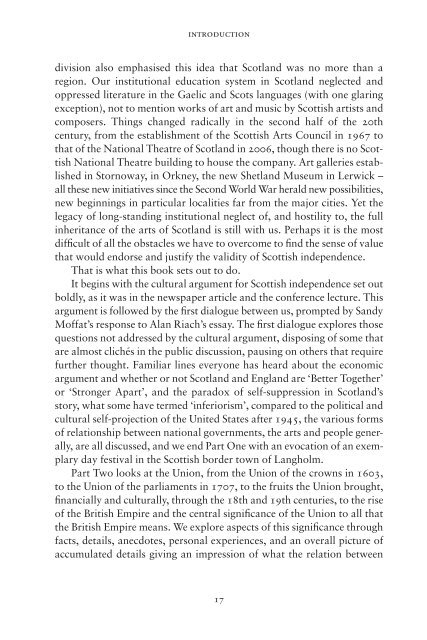Arts of Independence by Alexander Moffat and Alan Riach sampler
ALEXANDER MOFFAT and ALAN RIACH take a hard look at the most neglected aspect of the argument for Scotland’s distinctive national identity: the arts. Their proposition is that music, painting, architecture and, pre-eminently, literature, are the fuel and fire that makes imagination possible. Neglect them at your peril. For Moffat and Riach, jobs, health and trade are matters of material fact that need to be enlivened by imagination. How can we organise society to help us approach what the arts have to give. Why have we been so poor at representing our arts comprehensively, both within Scotland and internationally? What can be done? How might things be different? The arts are of paramount importance in the modern world. Moffat and Riach take the argument out of the hands of politicians and economists and beyond the petty squabbles of party politics.
ALEXANDER MOFFAT and ALAN RIACH take a hard look at the most neglected aspect of the argument for Scotland’s distinctive national identity: the arts. Their proposition is that music, painting, architecture and, pre-eminently, literature, are the fuel and fire that makes imagination possible. Neglect them at your peril. For Moffat and Riach, jobs, health and trade are matters of material fact that need to be enlivened by imagination. How can we organise society to help us approach what the arts have to give. Why have we been so poor at representing our arts comprehensively, both within Scotland and internationally? What can be done? How might things be different? The arts are of paramount importance in the modern world. Moffat and Riach take the argument out of the hands of politicians and economists and beyond the petty squabbles of party politics.
- No tags were found...
Create successful ePaper yourself
Turn your PDF publications into a flip-book with our unique Google optimized e-Paper software.
introduction<br />
division also emphasised this idea that Scotl<strong>and</strong> was no more than a<br />
region. Our institutional education system in Scotl<strong>and</strong> neglected <strong>and</strong><br />
oppressed literature in the Gaelic <strong>and</strong> Scots languages (with one glaring<br />
exception), not to mention works <strong>of</strong> art <strong>and</strong> music <strong>by</strong> Scottish artists <strong>and</strong><br />
composers. Things changed radically in the second half <strong>of</strong> the 20th<br />
century, from the establishment <strong>of</strong> the Scottish <strong>Arts</strong> Council in 1967 to<br />
that <strong>of</strong> the National Theatre <strong>of</strong> Scotl<strong>and</strong> in 2006, though there is no Scottish<br />
National Theatre building to house the company. Art galleries established<br />
in Stornoway, in Orkney, the new Shetl<strong>and</strong> Museum in Lerwick –<br />
all these new initiatives since the Second World War herald new possi bilities,<br />
new beginnings in particular localities far from the major cities. Yet the<br />
legacy <strong>of</strong> long-st<strong>and</strong>ing institutional neglect <strong>of</strong>, <strong>and</strong> hostility to, the full<br />
inheritance <strong>of</strong> the arts <strong>of</strong> Scotl<strong>and</strong> is still with us. Perhaps it is the most<br />
difficult <strong>of</strong> all the obstacles we have to overcome to find the sense <strong>of</strong> value<br />
that would endorse <strong>and</strong> justify the validity <strong>of</strong> Scottish independence.<br />
That is what this book sets out to do.<br />
It begins with the cultural argument for Scottish independence set out<br />
boldly, as it was in the newspaper article <strong>and</strong> the conference lecture. This<br />
argument is followed <strong>by</strong> the first dialogue between us, prompted <strong>by</strong> S<strong>and</strong>y<br />
M<strong>of</strong>fat’s response to <strong>Alan</strong> <strong>Riach</strong>’s essay. The first dialogue explores those<br />
questions not addressed <strong>by</strong> the cultural argument, disposing <strong>of</strong> some that<br />
are almost clichés in the public discussion, pausing on others that require<br />
further thought. Familiar lines everyone has heard about the economic<br />
argument <strong>and</strong> whether or not Scotl<strong>and</strong> <strong>and</strong> Engl<strong>and</strong> are ‘Better Together’<br />
or ‘Stronger Apart’, <strong>and</strong> the paradox <strong>of</strong> self-suppression in Scotl<strong>and</strong>’s<br />
story, what some have termed ‘inferiorism’, compared to the political <strong>and</strong><br />
cultural self-projection <strong>of</strong> the United States after 1945, the various forms<br />
<strong>of</strong> relationship between national governments, the arts <strong>and</strong> people generally,<br />
are all discussed, <strong>and</strong> we end Part One with an evocation <strong>of</strong> an exemplary<br />
day festival in the Scottish border town <strong>of</strong> Langholm.<br />
Part Two looks at the Union, from the Union <strong>of</strong> the crowns in 1603,<br />
to the Union <strong>of</strong> the parliaments in 1707, to the fruits the Union brought,<br />
financially <strong>and</strong> culturally, through the 18th <strong>and</strong> 19th centuries, to the rise<br />
<strong>of</strong> the British Empire <strong>and</strong> the central significance <strong>of</strong> the Union to all that<br />
the British Empire means. We explore aspects <strong>of</strong> this significance through<br />
facts, details, anecdotes, personal experiences, <strong>and</strong> an overall picture <strong>of</strong><br />
accumulated details giving an impression <strong>of</strong> what the relation between<br />
17


















